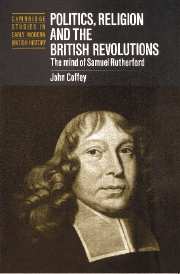Book contents
- Frontmatter
- Contents
- Acknowledgements
- List of abbreviations
- 1 Introduction
- 2 Biography
- 3 The scholar
- 4 The Puritan pastor
- 5 The Reformed theologian
- 6 The political theorist
- 7 The ecclesiastical statesman
- 8 The national prophet
- Conclusion: The failure of godly rule
- Bibliography of Samuel Rutherford
- General bibliography
- Index
- Titles in the series
8 - The national prophet
Published online by Cambridge University Press: 31 October 2009
- Frontmatter
- Contents
- Acknowledgements
- List of abbreviations
- 1 Introduction
- 2 Biography
- 3 The scholar
- 4 The Puritan pastor
- 5 The Reformed theologian
- 6 The political theorist
- 7 The ecclesiastical statesman
- 8 The national prophet
- Conclusion: The failure of godly rule
- Bibliography of Samuel Rutherford
- General bibliography
- Index
- Titles in the series
Summary
PROVIDENCE
Early modern Europeans believed in a God who was active in the world he had created. Not only did he uphold the natural processes of his earth, he also intervened directly to display his pleasure and displeasure to men through specific events. Books like Thomas Beard's The Theatre of God's judgements (1631) related tales which illustrated the principle that God frequently made his opinions on human actions manifestly clear. Such providentialism rested on a belief in the all-pervasiveness of divine intervention and in ‘the decipherability of particular providences’.
Both of these convictions were firmly held by Samuel Rutherford. He believed that all that happens in the world happens because of God's ‘influences’. God determined the number of stars, the length of our lives, and he determined that Jehoash should smite the ground three times and not six. That this was so was enough to produce ‘precious thoughts’ in the mind of the believer, for he saw ‘millions and numberless numbers of influences with all the drops of rain, hail, dew falling between the creation and the dissolving of the world’. It was sheer atheism to think that ‘all the stirrings in Nature, Societies and Kingdoms, were set on work by the sway of Nature, and blind Fortune without God, as a wheel rolling about with the mighty violence of a strong arm, moves a long time, after the arm of the mover is removed’.
- Type
- Chapter
- Information
- Politics, Religion and the British RevolutionsThe Mind of Samuel Rutherford, pp. 225 - 253Publisher: Cambridge University PressPrint publication year: 1997



